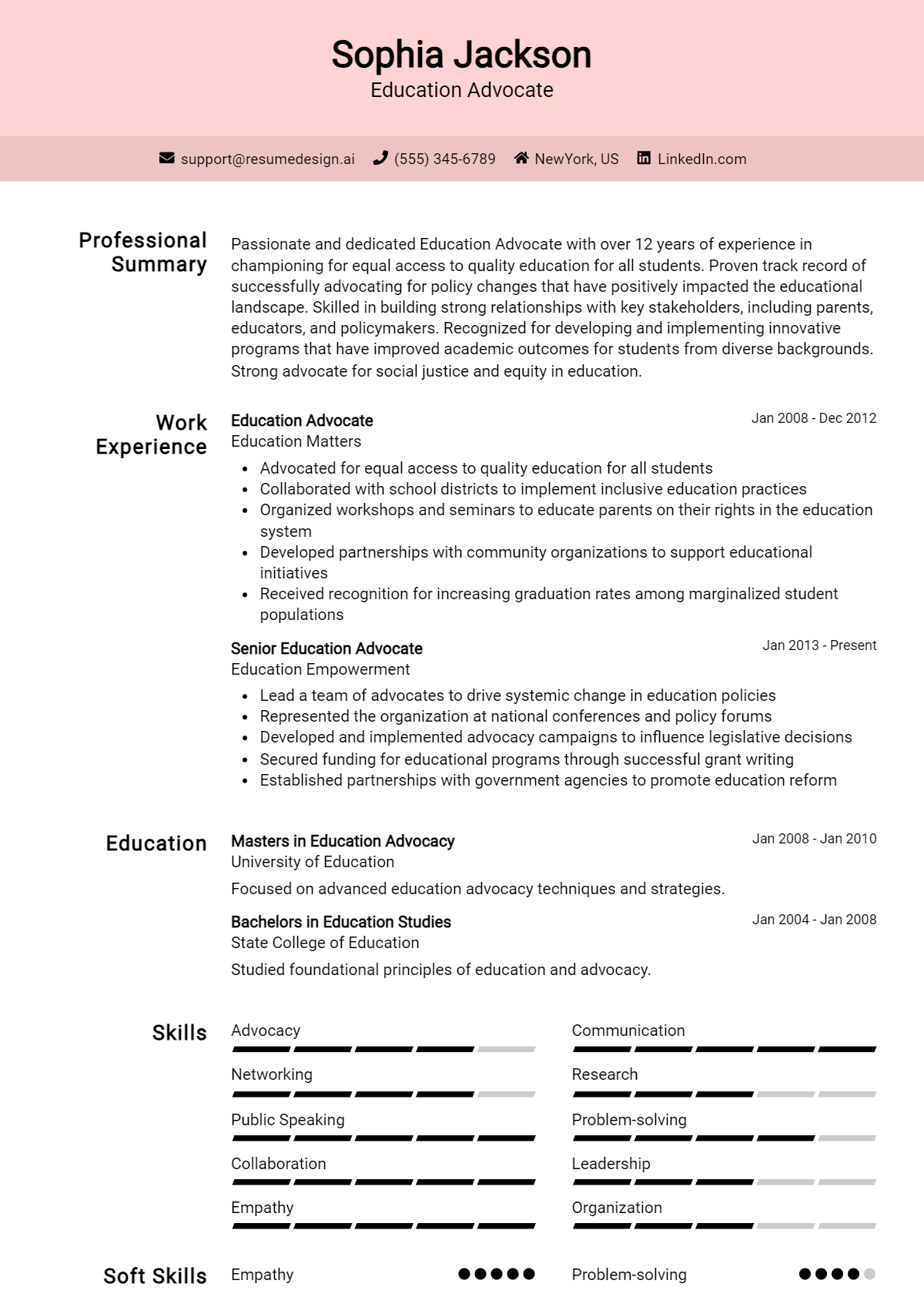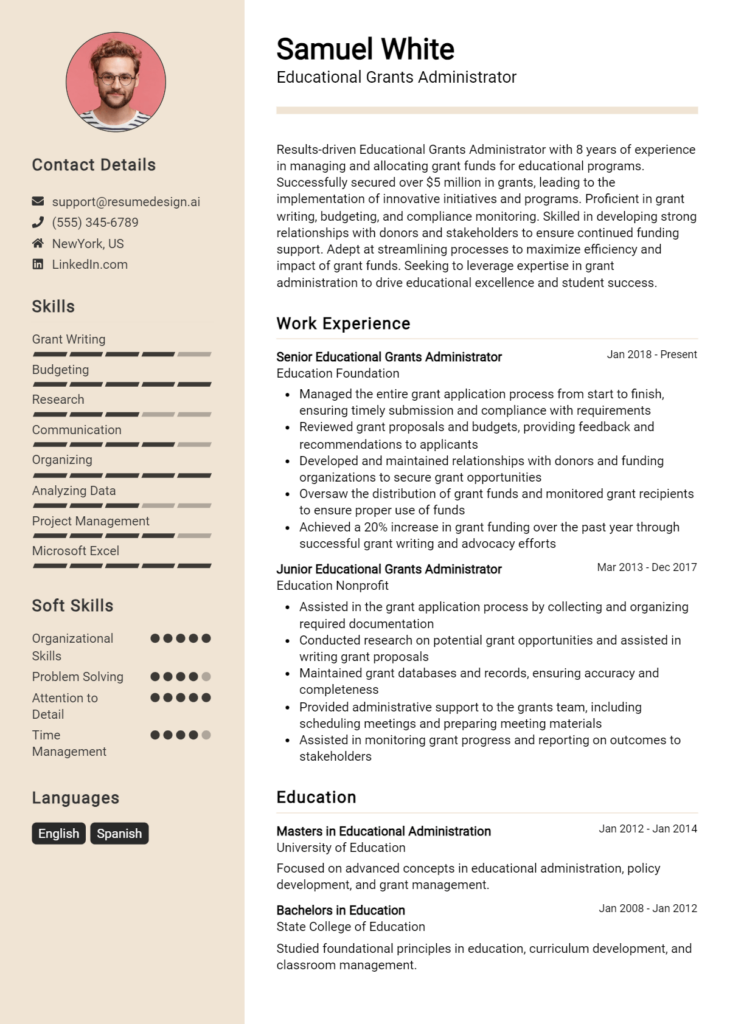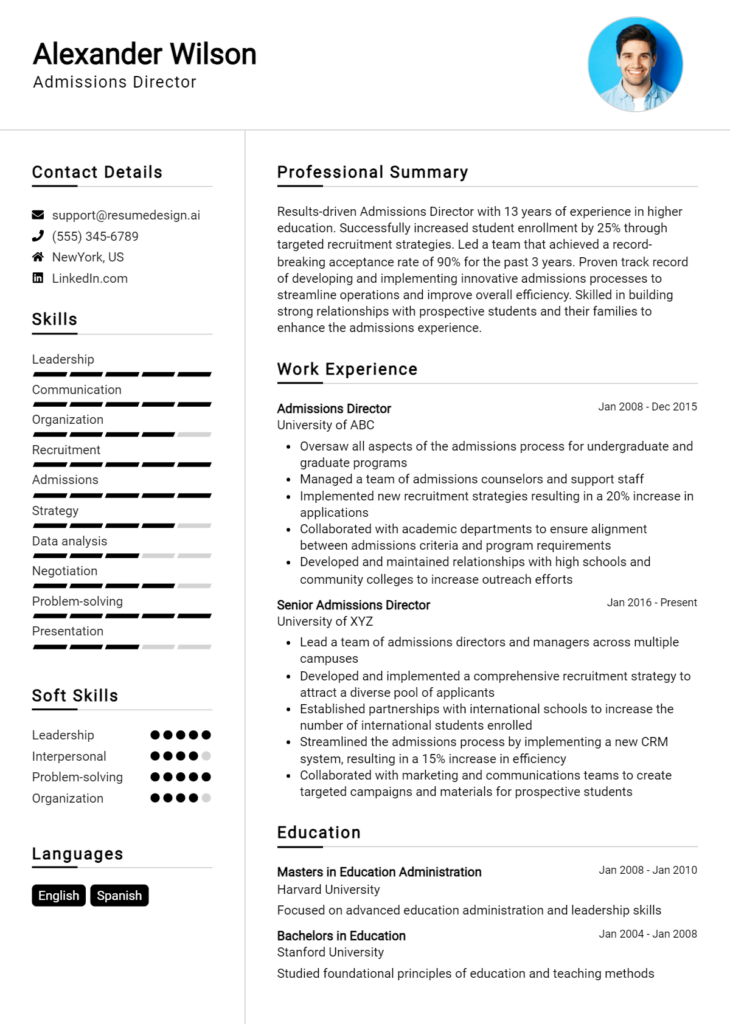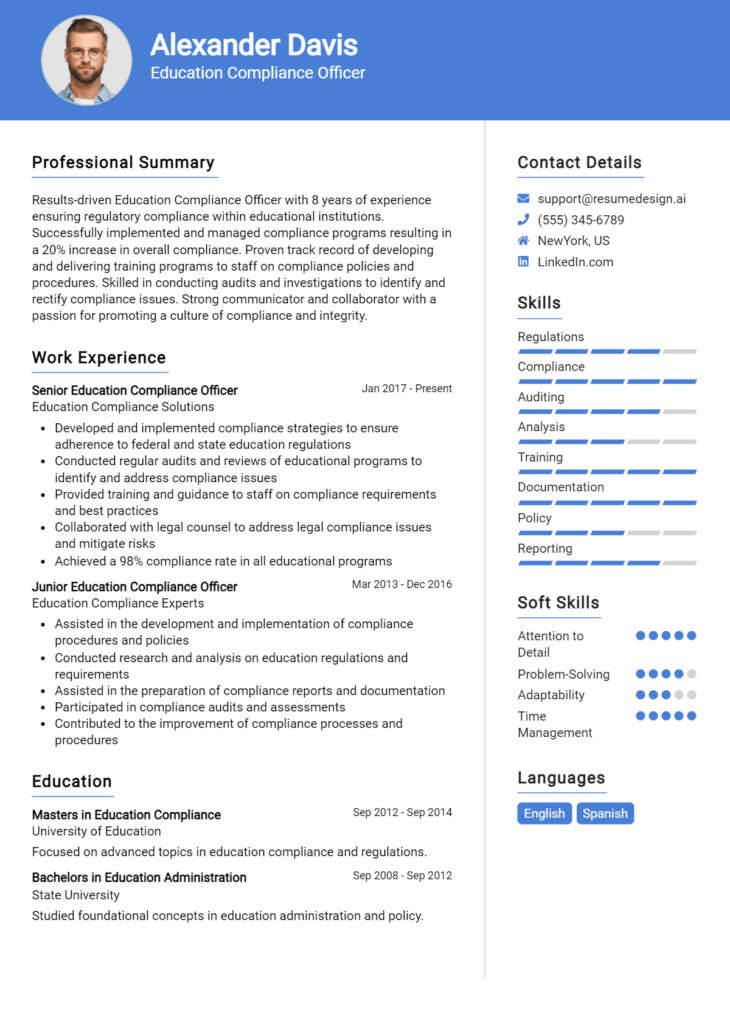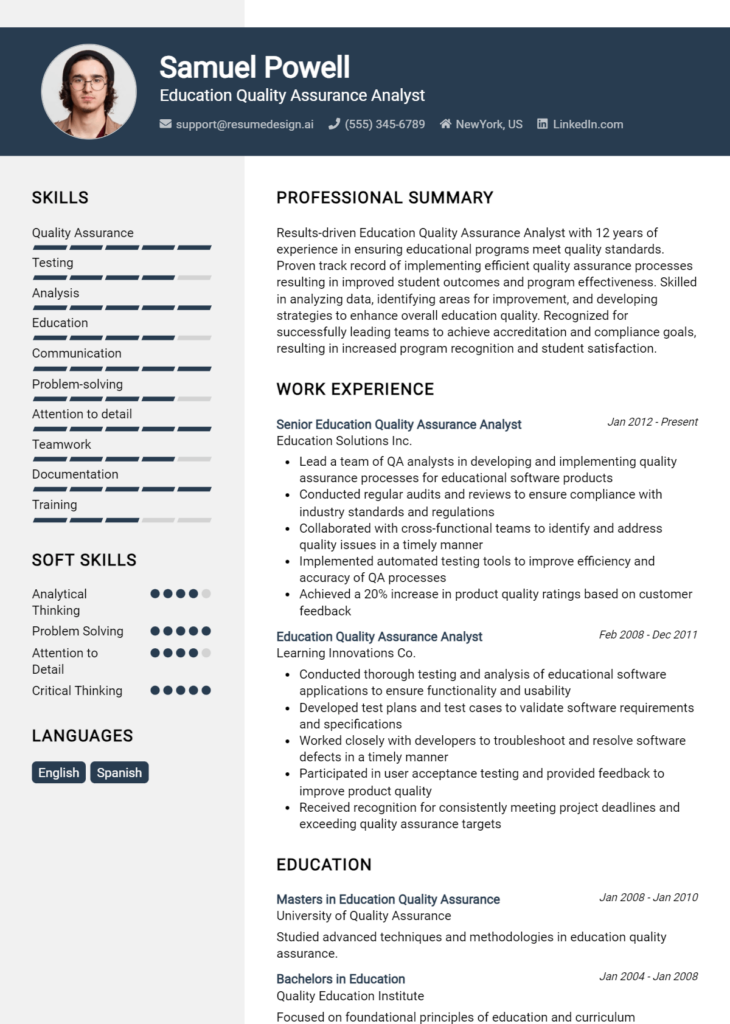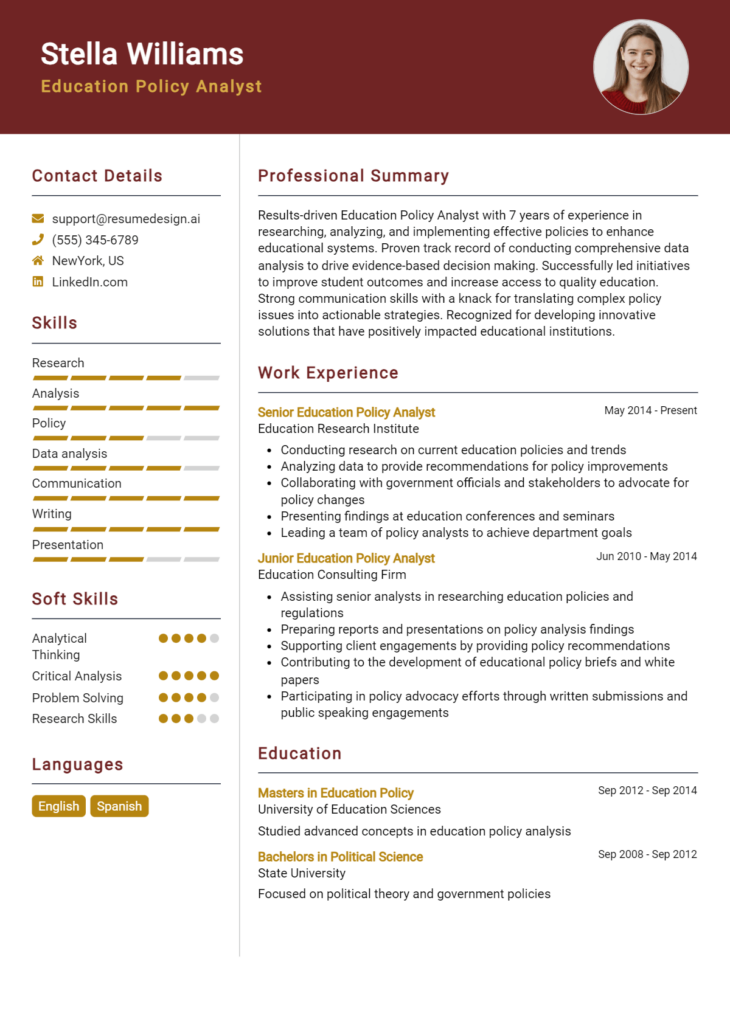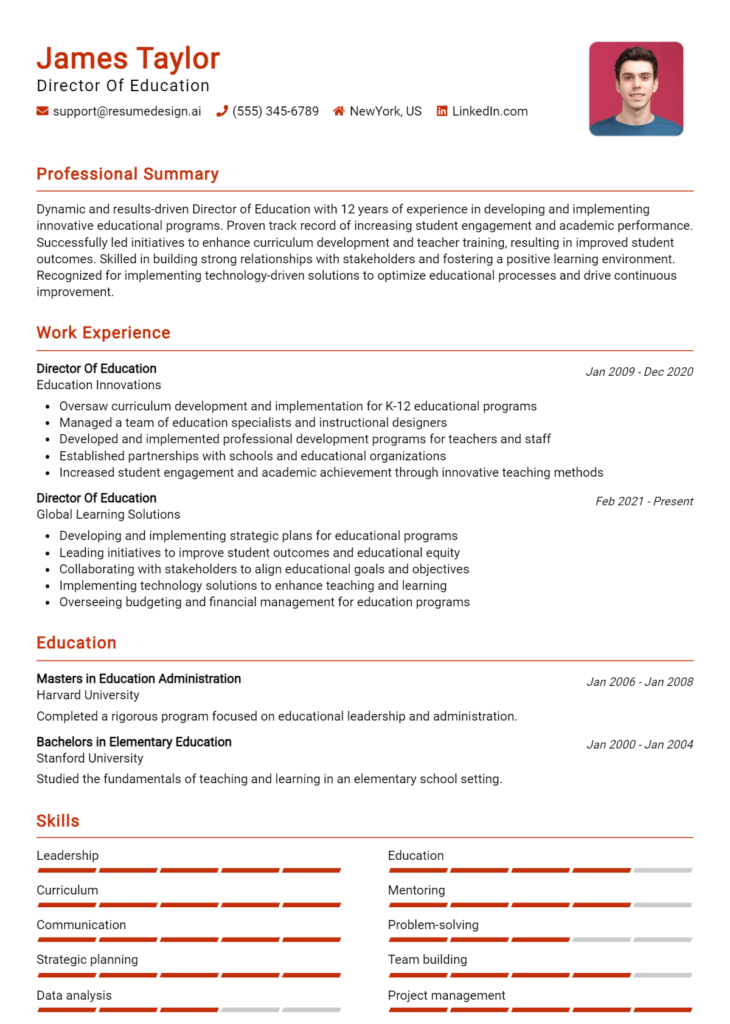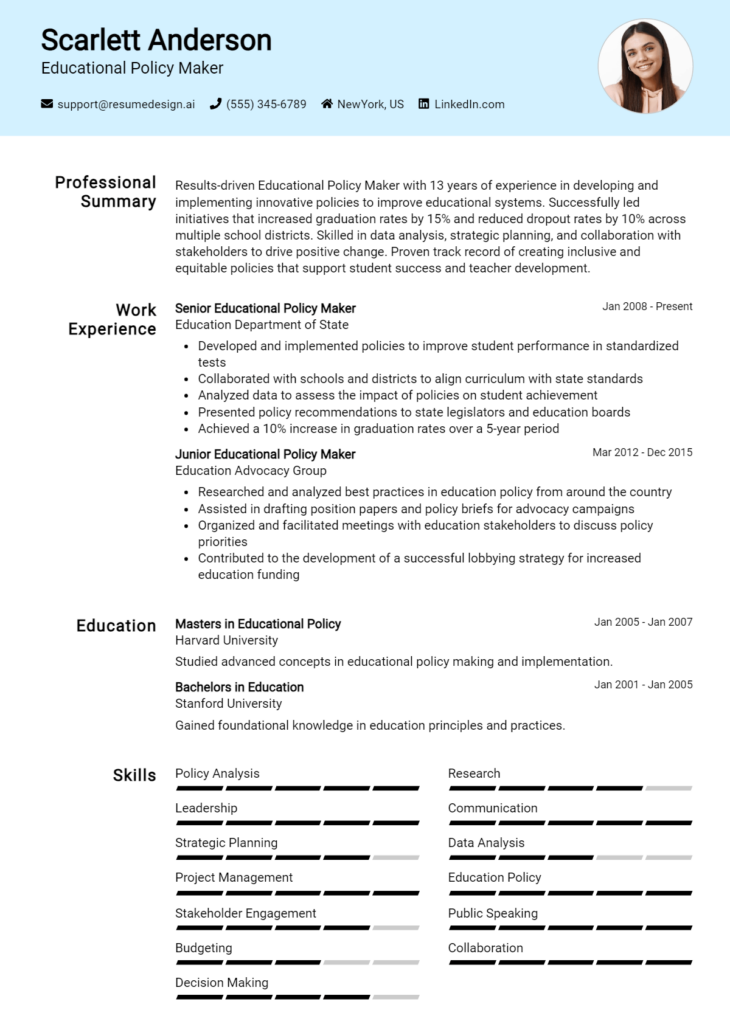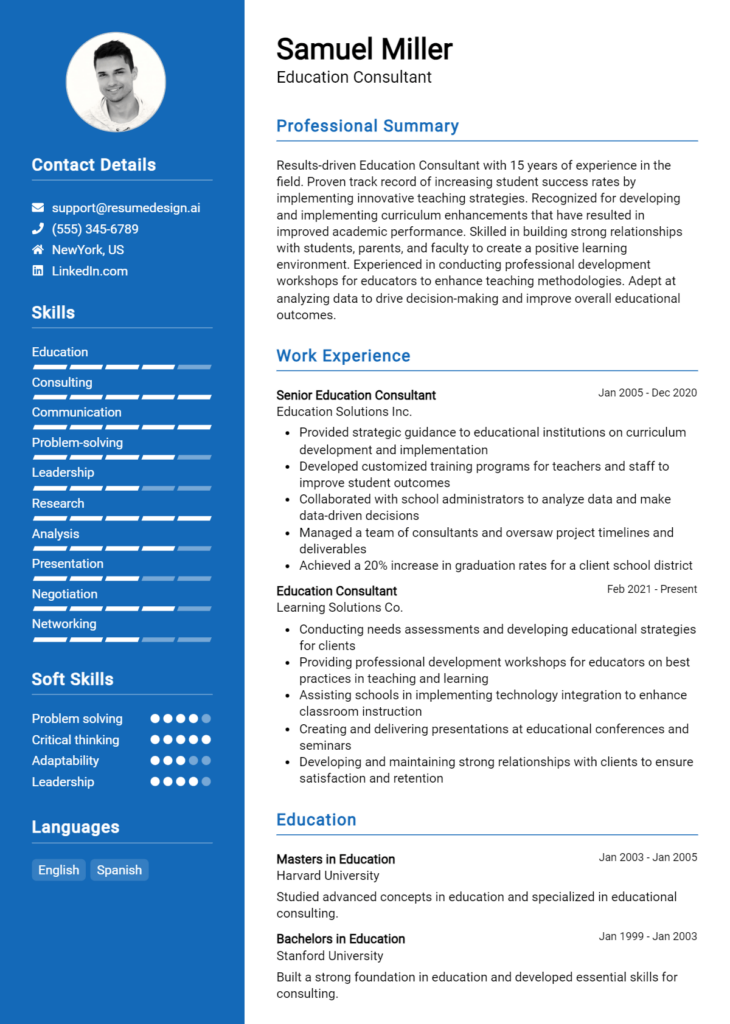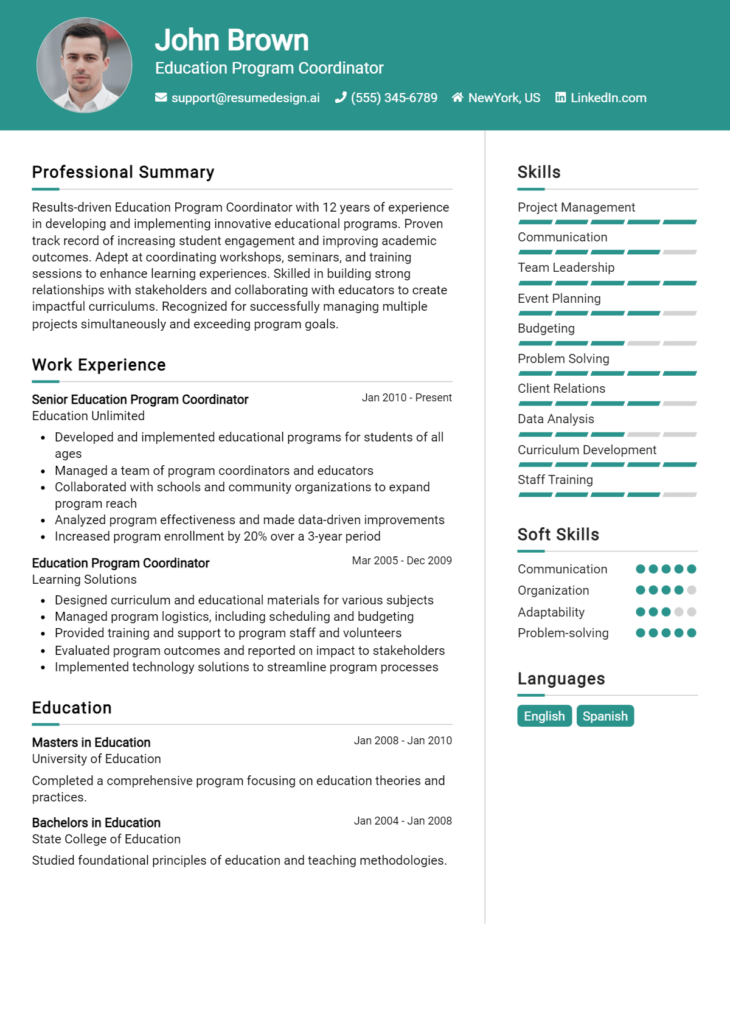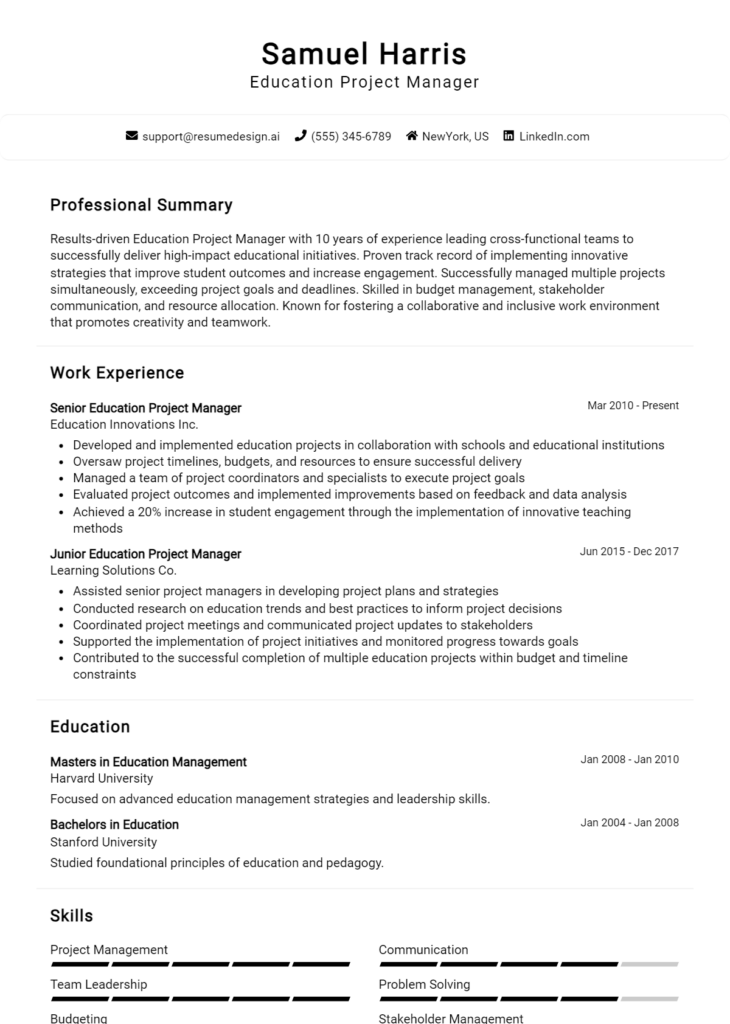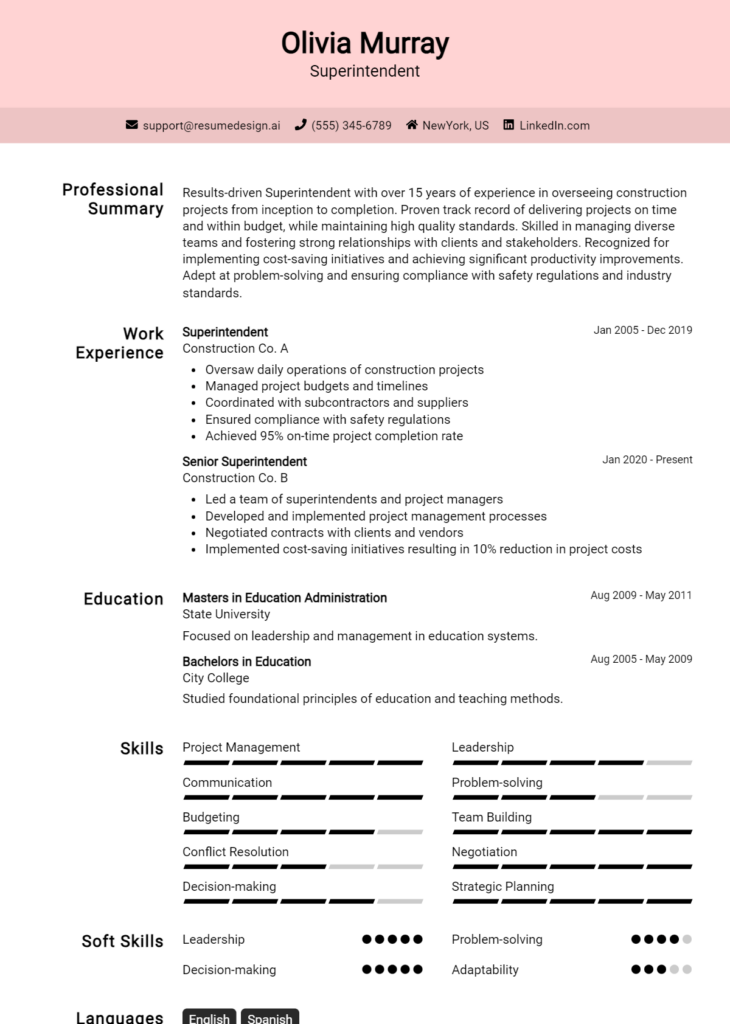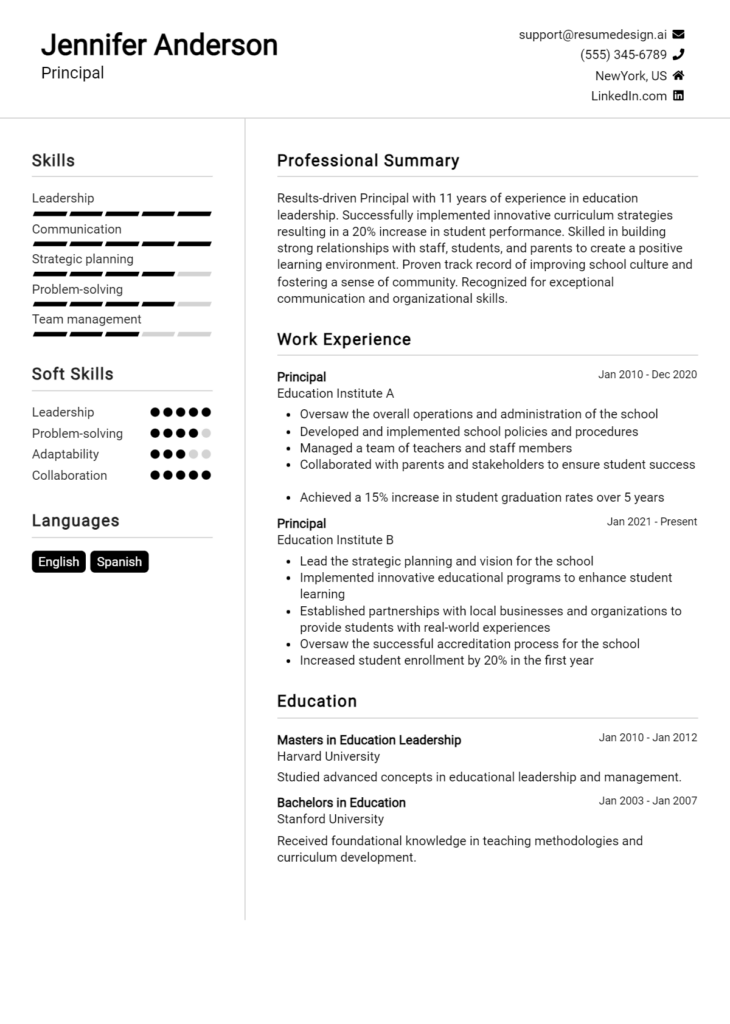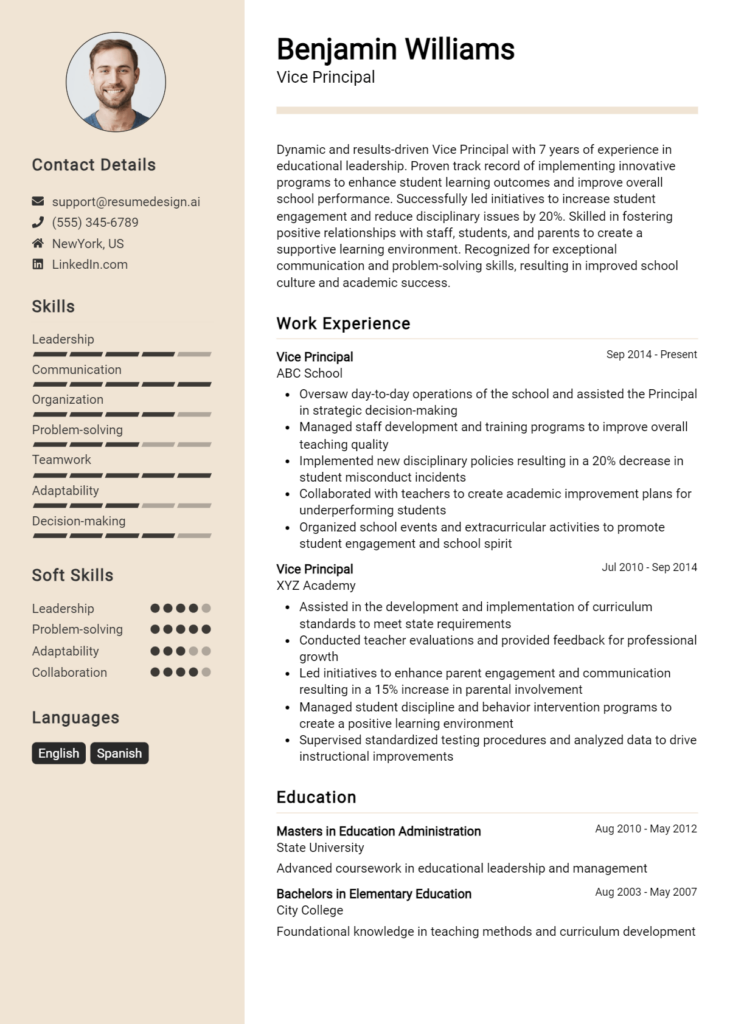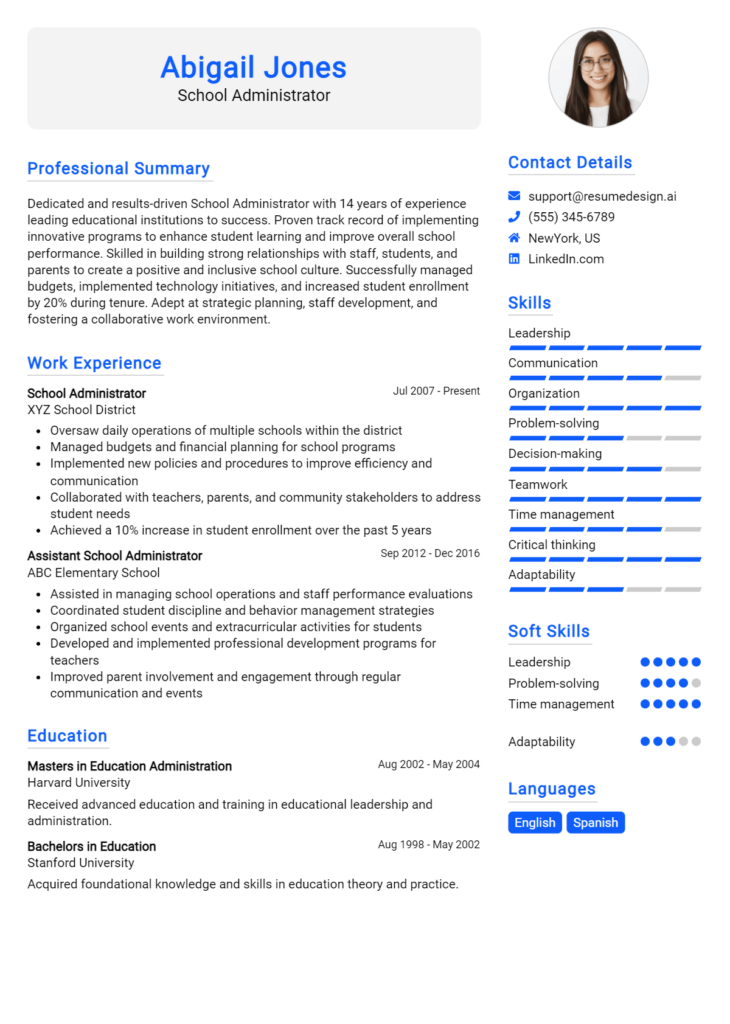Education Advocate Core Responsibilities
An Education Advocate plays a vital role in bridging various departments such as administration, curriculum development, and student services. Key responsibilities include promoting educational policies, facilitating communication between stakeholders, and addressing student needs. Essential skills encompass technical proficiency in educational software, operational insights to enhance program efficiency, and strong problem-solving abilities to navigate challenges. These competencies are crucial in achieving the organization's overall goals, and a well-structured resume can effectively showcase these qualifications to potential employers.
Common Responsibilities Listed on Education Advocate Resume
- Advocate for student needs and rights within educational institutions.
- Collaborate with teachers, parents, and administrators to develop effective programs.
- Analyze educational policies and their impact on student success.
- Conduct workshops and training sessions for staff on advocacy issues.
- Develop and implement outreach initiatives to engage the community.
- Monitor and evaluate the effectiveness of educational programs.
- Assist in conflict resolution between students, parents, and school staff.
- Provide resources and support for students with special needs.
- Gather and analyze data to inform advocacy strategies.
- Maintain up-to-date knowledge of educational laws and regulations.
- Prepare reports and presentations for stakeholders.
- Foster partnerships with local organizations to enhance educational opportunities.
High-Level Resume Tips for Education Advocate Professionals
In the competitive landscape of education advocacy, a well-crafted resume is not just a document—it's a vital tool that can open doors to impactful career opportunities. For Education Advocate professionals, the resume serves as the first impression you make on potential employers, making it essential to reflect not only your skills but also your achievements in a compelling manner. This guide will provide practical and actionable resume tips specifically tailored for Education Advocate professionals, ensuring that your qualifications stand out in a crowded field.
Top Resume Tips for Education Advocate Professionals
- Tailor your resume to the specific job description by incorporating keywords and phrases that align with the position.
- Showcase relevant experience in education advocacy, including internships, volunteer work, or professional roles that demonstrate your commitment to the field.
- Quantify your achievements where possible, using metrics to illustrate the impact of your work (e.g., "Increased student engagement by 30% through targeted advocacy initiatives").
- Highlight industry-specific skills such as policy analysis, communication, and community outreach that are essential for education advocacy roles.
- Utilize a clear and organized format, making it easy for hiring managers to skim through your qualifications quickly.
- Include a strong summary statement at the top of your resume that encapsulates your passion for education advocacy and your career objectives.
- Incorporate relevant certifications or training that enhance your credibility as an education advocate.
- Keep your resume to one or two pages, ensuring that every word adds value and relevance to your application.
- Proofread your resume for grammar and spelling errors, as attention to detail is crucial in any professional document.
By implementing these tips, you can significantly increase your chances of landing a job in the Education Advocate field. A polished and thoughtfully constructed resume will not only showcase your qualifications but also demonstrate your dedication to making a positive impact in education, setting you apart from the competition.
Why Resume Headlines & Titles are Important for Education Advocate
In the competitive field of education advocacy, a well-crafted resume headline or title serves as a crucial first impression. It acts as a beacon that captures the attention of hiring managers, succinctly summarizing a candidate's key qualifications and expertise in just a few words. A strong headline should be concise, relevant, and directly connected to the specific job being applied for, allowing potential employers to quickly assess the applicant's fit for the role. By effectively encapsulating the essence of the candidate’s professional identity, a compelling headline can set the tone for the entire resume and significantly enhance the likelihood of securing an interview.
Best Practices for Crafting Resume Headlines for Education Advocate
- Keep it concise and to the point, ideally under 10 words.
- Use specific language that directly relates to the education advocacy role.
- Highlight key qualifications or unique skills that set you apart.
- Include relevant keywords from the job description to align with employer expectations.
- Make it impactful by using action verbs or powerful adjectives.
- Avoid jargon or overly complex phrases that may confuse the reader.
- Tailor the headline for each specific position you apply for.
- Consider including quantifiable achievements to enhance credibility.
Example Resume Headlines for Education Advocate
Strong Resume Headlines
Passionate Education Advocate with 10+ Years of Experience in Policy Reform
Dynamic Advocate for Educational Equity and Student Rights
Results-Driven Education Specialist Committed to Transformative Practices
Weak Resume Headlines
Education Advocate Seeking Opportunities
Hardworking Individual in Education
The strong headlines are effective because they are specific, engaging, and provide a clear indication of the candidate's expertise and commitment to the field. They highlight unique strengths and experiences that differentiate the candidate from others, making a memorable impact. In contrast, the weak headlines fail to impress due to their vagueness and lack of detail; they do not convey any distinctive qualifications or enthusiasm, which can lead hiring managers to overlook these candidates in favor of those with more compelling and relevant titles.
Writing an Exceptional Education Advocate Resume Summary
A resume summary is a critical component for an Education Advocate, as it serves as the first impression for hiring managers. An exceptional summary quickly captures attention by succinctly showcasing key skills, relevant experience, and notable accomplishments that align with the job role. It should be concise yet impactful, tailored specifically to the position being applied for, and designed to highlight the candidate's unique qualifications. A well-crafted summary can set the tone for the rest of the resume, making it easier for employers to envision the candidate as a valuable addition to their team.
Best Practices for Writing a Education Advocate Resume Summary
- Quantify achievements: Use numbers and statistics to demonstrate impact, such as the number of students assisted or programs developed.
- Focus on relevant skills: Highlight core competencies that are directly applicable to the Education Advocate role, such as communication, advocacy, and conflict resolution.
- Tailor the summary: Customize each summary to reflect the specific job description and requirements of the position you are applying for.
- Use active language: Employ strong action verbs to convey enthusiasm and proactivity in your advocacy efforts.
- Keep it concise: Aim for 2-4 sentences that deliver maximum information without overwhelming the reader.
- Highlight soft skills: Include interpersonal skills like empathy, patience, and collaboration, which are essential for working with diverse groups.
- Showcase relevant experience: Briefly mention past roles or accomplishments that illustrate your capacity to fulfill the responsibilities of the position.
- Avoid jargon: Use clear and straightforward language to ensure your summary is easily understood by all readers.
Example Education Advocate Resume Summaries
Strong Resume Summaries
Dedicated Education Advocate with over 5 years of experience promoting access to quality education for underserved communities, successfully increasing enrollment rates by 30% in targeted areas through innovative outreach programs.
Results-oriented Education Advocate skilled in developing and implementing educational programs, achieving a 95% satisfaction rate among participants while collaborating with local schools and community organizations to enhance educational resources.
Compassionate Education Advocate with a proven track record of supporting over 200 students annually, utilizing personalized strategies that improved academic performance by an average of 20% within one academic year.
Weak Resume Summaries
Education Advocate with experience in schools. Looking for a new opportunity to help students.
Passionate about education and helping others. Seeking a position that allows me to make a difference.
The strong resume summaries are considered effective because they are specific, quantify achievements, and directly relate to the responsibilities of an Education Advocate, demonstrating a clear impact on students and communities. In contrast, the weak summaries lack detail, fail to provide measurable outcomes, and come across as generic, making it difficult for hiring managers to assess the candidate's qualifications or potential contributions to the role.
Work Experience Section for Education Advocate Resume
The work experience section of an Education Advocate resume is a critical component that highlights the candidate's technical skills, team management abilities, and capacity to deliver high-quality educational products and services. This section serves as a narrative that demonstrates how past roles have prepared the candidate for future challenges in educational advocacy. By quantifying achievements and aligning experiences with industry standards, candidates can effectively convey their impact and competence to potential employers, making a compelling case for their candidacy.
Best Practices for Education Advocate Work Experience
- Focus on quantifiable achievements, using metrics and numbers to illustrate impact.
- Highlight relevant technical skills and tools that are applicable to the education sector.
- Emphasize collaboration by detailing experiences working within teams or cross-functional groups.
- Use action verbs to convey proactivity and leadership in past roles.
- Tailor each experience to align with the specific requirements of the job being applied for.
- Include relevant certifications or training that enhance your qualifications.
- Maintain a clear and concise format for easy readability and comprehension.
- Showcase your ability to manage projects and lead initiatives to successful completion.
Example Work Experiences for Education Advocate
Strong Experiences
- Developed and implemented a community outreach program that increased student enrollment by 35% over two academic years.
- Led a team of 10 educators in the creation of a new curriculum that improved student test scores by an average of 20%.
- Collaborated with local government agencies to secure $500,000 in funding for educational programs aimed at underserved populations.
- Facilitated workshops for over 300 parents on educational advocacy, resulting in a 50% increase in parental involvement in school activities.
Weak Experiences
- Worked on various education-related projects without specific outcomes or metrics provided.
- Participated in meetings with education stakeholders but did not lead any initiatives or programs.
- Assisted in project management tasks without detailing contributions or results.
- Helped organize events that didn't have measurable success or attendance figures.
The examples listed as strong experiences are considered effective because they clearly quantify achievements and demonstrate the candidate's ability to lead and collaborate successfully, making a tangible impact in their roles. In contrast, the weak experiences lack specificity and measurable outcomes, making it difficult for potential employers to gauge the candidate's true contributions and capabilities in the field of education advocacy.
Education and Certifications Section for Education Advocate Resume
The Education and Certifications section of an Education Advocate resume plays a crucial role in establishing the candidate's qualifications and expertise in the field of education advocacy. This section not only highlights the academic background of the candidate but also showcases any industry-relevant certifications and ongoing learning efforts that demonstrate commitment to professional development. By providing details about relevant coursework, specialized training, and recognized credentials, candidates can significantly enhance their credibility and align their qualifications with the specific requirements of the job role, making a compelling case for their suitability as an Education Advocate.
Best Practices for Education Advocate Education and Certifications
- Prioritize relevant degrees and certifications that align with education advocacy.
- Include specific coursework that directly relates to the skills and knowledge required for the role.
- Highlight any advanced degrees or specialized training in education policy or advocacy.
- List industry-recognized certifications, such as those from educational organizations or advocacy groups.
- Be concise but detailed, ensuring each entry clearly communicates its relevance to the job role.
- Update the section regularly to reflect any new qualifications or ongoing professional development.
- Consider including relevant volunteer experiences or practicum that demonstrate applied skills in education advocacy.
- Use clear formatting to make the section easy to read and visually appealing.
Example Education and Certifications for Education Advocate
Strong Examples
- M.Ed in Educational Leadership, University of Education, 2021
- Certified Education Advocate (CEA), National Education Advocacy Institute, 2022
- Coursework: Advocacy Strategies in Education Policy, Child Development and Learning, 2020
- Training: Effective Communication for Education Professionals, 2023
Weak Examples
- Bachelor’s in Business Administration, University of Business, 2018
- Certificate in Event Planning, Community College, 2019
- Coursework: Introduction to Marketing, 2017
- Old Certification: Basic First Aid, 2015
The strong examples provided are considered effective because they are directly relevant to the role of an Education Advocate, showcasing degrees and certifications that enhance the candidate's qualifications for advocacy within the education sector. In contrast, the weak examples include qualifications that do not pertain to education advocacy, such as a degree in business administration or certificates in unrelated fields, which detract from the candidate's alignment with the role and may suggest a lack of focus on education-related expertise.
Top Skills & Keywords for Education Advocate Resume
As an Education Advocate, showcasing your skills on a resume is crucial for effectively communicating your qualifications to potential employers. Skills not only reflect your ability to perform the job but also demonstrate your capacity to support and empower students, families, and educational institutions. A well-crafted resume emphasizes both hard and soft skills, allowing you to present a holistic view of your capabilities. By highlighting these skills, you increase your chances of standing out in a competitive job market and securing a position that aligns with your passion for education.
Top Hard & Soft Skills for Education Advocate
Soft Skills
- Excellent communication skills
- Empathy and active listening
- Problem-solving abilities
- Conflict resolution
- Team collaboration
- Advocacy and persuasion
- Cultural competence
- Time management
- Adaptability and flexibility
- Leadership qualities
- Emotional intelligence
- Networking skills
- Patience and resilience
- Critical thinking
Hard Skills
- Knowledge of educational policies and regulations
- Grant writing and fundraising
- Data analysis and reporting
- Program development and evaluation
- Familiarity with special education laws
- Public speaking and presentation skills
- Research skills
- Knowledge of community resources
- Proficient in Microsoft Office Suite
- Experience with educational technology
- Budget management
- Project management
- Familiarity with advocacy tools and platforms
- Legal research related to education
- Social media management for advocacy purposes
- Bilingual or multilingual capabilities
- Training and workshop facilitation
To further enhance your resume, consider exploring additional skills and highlighting relevant work experience that complements your advocacy efforts in education.
Stand Out with a Winning Education Advocate Cover Letter
Dear [Hiring Manager's Name],
I am writing to express my enthusiasm for the Education Advocate position at [Organization Name], as advertised on [where you found the job listing]. With a strong background in educational policy and community engagement, I am passionate about promoting equitable access to quality education for all students. My experience working with diverse communities has equipped me with the skills necessary to effectively champion educational initiatives that address the unique needs of each student.
In my previous role at [Previous Organization], I successfully led several outreach programs designed to connect underrepresented families with essential educational resources. I collaborated with local schools, community organizations, and parents to develop workshops that informed families about available educational opportunities, funding options, and support services. My ability to build relationships and communicate complex information in an accessible manner resulted in a 30% increase in participation in our programs over two years. I believe these experiences have prepared me well to advocate for the needs of students and families at [Organization Name].
I am particularly drawn to [Organization Name]'s commitment to [specific mission or value of the organization], and I am eager to contribute my skills in advocacy, policy analysis, and community engagement to support your efforts. I am excited about the possibility of working alongside a dedicated team to develop and implement initiatives that promote educational equity and improve outcomes for all students. Thank you for considering my application; I look forward to the opportunity to discuss how my background and passion for education can contribute to the important work at [Organization Name].
Sincerely,
[Your Name]
[Your Contact Information]
Common Mistakes to Avoid in a Education Advocate Resume
Crafting a compelling resume as an Education Advocate is crucial for standing out in a competitive job market. However, many candidates make common mistakes that can undermine their chances of landing an interview. Understanding these pitfalls can significantly enhance the effectiveness of your resume and better showcase your qualifications and passion for educational advocacy. Here are some frequent mistakes to avoid:
Generic Objective Statement: Using a vague or generic objective can fail to capture the attention of hiring managers. Tailor your objective to reflect your specific skills and aspirations related to education advocacy.
Overloading with Jargon: While industry-specific language can demonstrate your expertise, excessive jargon can alienate readers. Strive for clarity and balance between professional terminology and accessible language.
Neglecting Quantifiable Achievements: Failing to include specific, quantifiable achievements can weaken your resume. Highlight measurable outcomes from your previous roles, such as the number of students impacted or programs implemented.
Ignoring Formatting Consistency: Inconsistent formatting can create a disorganized appearance. Ensure uniformity in font size, style, and bullet points to present a polished and professional document.
Lack of Tailoring to Job Description: Submitting a one-size-fits-all resume can diminish your chances. Customize your resume for each application, aligning your skills and experiences with the specific requirements of the position.
Excessive Length: A lengthy resume can deter readers. Aim for brevity by focusing on the most relevant experiences and skills, ideally keeping your resume to one or two pages.
Omitting Relevant Skills: Failing to list key skills relevant to education advocacy, such as communication, negotiation, or policy analysis, can leave your resume lacking. Make sure to highlight these competencies prominently.
Neglecting Professional Development: Not including relevant training, certifications, or professional development can make your resume less competitive. Showcase any continuous education or workshops that enhance your expertise in education advocacy.
Conclusion
As an Education Advocate, your role is vital in promoting equitable access to education and supporting the needs of students and families. Throughout this article, we explored the essential skills required for this position, including effective communication, policy knowledge, and advocacy strategies. We also discussed the importance of building strong relationships with stakeholders, such as educators, policymakers, and community organizations, to drive positive change in education systems.
Additionally, we highlighted the significance of staying informed about current educational issues and trends, as well as the need for continuous professional development to enhance your advocacy efforts. By understanding the challenges faced by students and their families, you can better represent their interests and work towards creating solutions that benefit all learners.
Now that you've gained insights into the key elements of being an effective Education Advocate, it's time to take action. Review your Education Advocate Resume to ensure it reflects your skills, experiences, and passion for education advocacy. Don’t forget to utilize the resources available to you, such as resume templates, resume builder, resume examples, and cover letter templates to craft a standout application. Equip yourself with the tools needed to make a lasting impact in the field of education advocacy!

